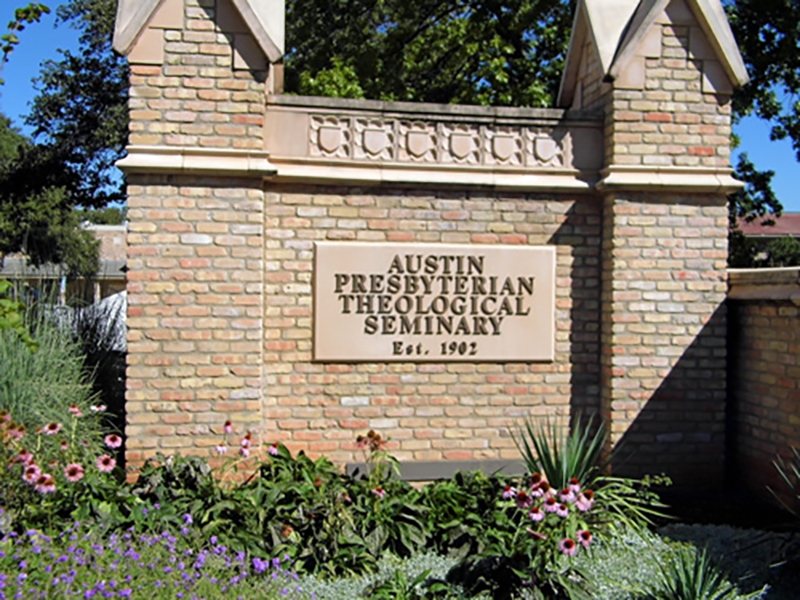

Last month, members of the Special Committee to Write a New Confession held its first in-person meeting on the grounds of Austin Presbyterian Theological Seminary.
The three-day gathering in mid-December saw the committee beginning a process that is expected to culminate in the presentation of a draft confession to the 227th General Assembly (2026), for possible inclusion in the Book of Confessions. At the 226th General Assembly this summer, committee leaders will report findings of their work to date.
Constituting the special committee are teaching elders, ruling elders and church members, including teaching elder co-moderators Edwin David Aponte of Mid-Kentucky Presbytery and Margaret Aymer of Mission Presbytery. Aymer is academic dean at APTS. Aponte is dean at Drew Theological School in Madison, NJ.
The co-moderators prepared a media statement following the gathering, which can be read here.
The release discusses the committee’s work to establish a shared understanding of their General Assembly mandate and its connection to three overtures that came out of the Theology, Worship, and Education Committee at the last General Assembly; the church’s confessional heritage; and how the committee will discern “what in this moment constitutes a status confessionis (Latin for ‘confessional status’ but also with a broader sense of making a clear statement of faith for a particular time and context).”
Dr. Dianna Wright, Director of Ecumenical & Interreligious Relations, attended the Austin meeting as denominational PC(USA) staff support. Wright works closely with the General Assembly Committee on Ecumenical and Interreligious Relations (GACEIR), which brought one of the three overtures to the last General Assembly. Another of those overtures urged taking “A Confession for Such a Time As This,” a statement by young ministry leaders in the Synod of the Northeast, under advisement in the crafting of a new confession. The 225th General Assembly approved a third overture, sent by Arkansas Presbytery, answering the other two overtures by its approval. The committee is reflecting on all three overtures during its work.
“The special committee spent a lot of time doing an overview of the current Book of Order for instruction on how to include a new confession in the Book of Confessions,” Wright said. “It also took time for everyone to get on the same page.” Helping with that effort was the PC(USA)’s Global Language Resources team, which through translation and interpretation services made it possible for a committee member to participate fully in discussions and worship in Korean.
Many of the committee’s conversations “focused on the times in which we live, when there is so much hatred and division,” Wright said. Much of that rancor connects back to the history of institutionalized racism.
In recent years GACEIR has been “focusing on racism across the church and having discussions about the depths of racism in the nation,” Wright said. “That’s why it proposed the writing of a new confession. GACEIR thought the church needs a new confession that would help the church come to terms with its own history related to those continuing issues as well as to Christian nationalism.”
GACEIR’s overture connects with its discussions in recent years about antisemitism and Islamophobia, including those that led to an overture in the Ecumenical and Interfaith Committee at the last General Assembly. “It’s important to think about how racism affects all people, not just Presbyterians,” Wright said.

Austin Presbyterian Theological Seminary Photo by Margaret W. Miller licensed under CC BY 3.0.

Austin Presbyterian Theological Seminary Photo by Margaret W. Miller licensed under CC BY 3.0.
The Rev. Dr. Barry Ensign-George, Manager in the Office of Theology & Worship, also serves as staff support for the special committee. He shared Wright’s sense that the group had gotten off to a good start.
“The committee members engaged both one another and the work with real energy and a sense of being about a shared project,” Ensign-George said. “And that’s encouraging. Members of the committee jumped into the work with high energy levels.”
Ensign-George said that Dr. Martha Moore-Keish and Dr. Charles Wiley, two special committee members, gave a thorough presentation on the heritage of confession writing reflected in the Book of Confessions that was well received by the full group. “Presbyterians have a long-standing commitment to articulating what we believe,” Ensign-George said. “That can mean confronting claims about Christian belief that are not truly Christian. Confessions can clarify our true beliefs.”
Sometimes there are beliefs in circulation in church and society that need to be addressed urgently, Ensign-George said. The Theological Declaration of Barmen and the Confession of Belhar are two examples of such statements already in the PC(USA) Book of Confessions, with the former responding to conditions in Nazi Germany and the latter Apartheid South Africa.
“The special committee is aware of the need to respond to particular concerns and to state the faith,” Ensign-George said. “Barman and Belhar were written to address specific situations. Other Christians, in other situations, read those documents and realized that their faith was being articulated through them.”
The Special Committee to Write a New Confession plans to meet monthly throughout 2024.
--Learn more about the Special Committee to Write a New Confession here.
--Read the special committee’s media release here.
